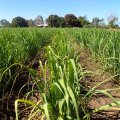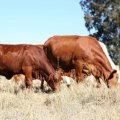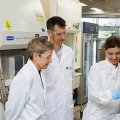Developing a cervical cancer vaccine and watching it start protecting millions of young women worldwide is more than most researchers would hope for in a lifetime.
But Professor Ian Frazer and his team at UQ’s Diamantina Institute for Cancer, Immunology and Metabolic Medicine are expected in the next few years to follow their first huge miracle with another: a vaccine against skin cancer.
That research was built on two synergies, said Professor Frazer. One, the institute’s location in Brisbane, “the skin cancer capital of the world” and two, that like cervical cancer, some skin cancers are virus-related.
“That virus is very similar to the one that causes cervical cancer,” said Professor Frazer, who developed the cervical cancer vaccine in partnership with the late Dr Jian Zhou. It is distributed worldwide under the brand names Gardasil and Cervarix.
Professor Frazer said he could not predict the outcome of the skin cancer research or a likely release date for a future vaccine.
“The best possible outcome is we might end up preventing skin cancer - or at least reducing its severity and incidence - with a vaccine that is very similar in the way it works to the one we use to prevent cervical cancer,” he said.
Professor Frazer’s ongoing UQ tenure dates from 1985, when the university’s medical school lured him away from the world-renowned Walter and Eliza Hall Institute in Melbourne.
Then, UQ’s drawcard for Professor Frazer was the medical school’s vision for translating scientific research into clinical practice.
A quarter of a century on, that vision is culminating in the development of the $354 million Translational Research Institute at Buranda in Brisbane. The institute – due for completion in 2012 and currently one of Brisbane’s biggest building projects – is just crossriver via the Eleanor Schonell Bridge from UQ’s St Lucia campus. The precinct has become an area of significant expansion for UQ, principally in the fields of medicine and science.
The TRI is a joint venture between UQ, PAH, Queensland University of Technology, the Mater Medical Research Institute and the Queensland Government. Funding has come from the federal and state governments, American philanthropist Charles Feeney, UQ and QUT.
It will be among the world’s biggest research institutes, rivalling in scope bodies such as the National Institute of Medical Research in London’s Mill Hill and the USA’s Institute of Allergy and Infectious Diseases at Bethesda in Maryland.
Eventually 700 researchers will work at the TRI, which will house the Diamantina Institute and researchers from PAH, QUT, MMRI and Biopharmaceuticals Australia (a Queensland Government production facility).
“All these people will be working in this area, translating basic science into practical, clinical outcomes,” Professor Frazer said.
The synergy between the Queensland Government and UQ had been “largely responsible for the research successes we have had on the PA campus”, he said.
“The links between Queensland Health and the university has enabled the wonderful research environment here.
“The Beattie Government’s vision of a Smart State might sound a little corny, but in reality it has delivered the infrastructure that has placed us in the world class in terms of our researchers,” Professor Frazer said.
“It’s a long-term investment that will pay really big dividends in future.
“I can tell you, other states are envious of what we have managed to achieve here over the past 10 years.”
Professor Frazer still teaches in the UQ medical school – which he joined all those years ago - but he now teaches more in the area of science.
His three sons have all studied at UQ: the eldest now works as veterinarian in New Zealand and the other two are midway through medical school, after earlier studying science and law, and engineering and science, respectively.
“I certainly get plenty of feedback through my children on how the uni is going!” Professor Frazer said.
Pharmaceutical company Merck has distributed 40 million doses of Gardasil, worth $4.6 billion, since its release in 2006.
The UK, Canada, Europe and the United States have widely adopted the vaccine, and more than 80 per cent of Australian secondary school girls have received it. The vaccine also is making its way into the developing world.
More than 500,000 cervical cancer cases are diagnosed each year, and the disease kills 275,000 women annually.
A string of awards followed Professor Frazer’s big discovery, including the CSIRO Eureka Prize for Leadership in Science (2005), Australian of the Year and Queenslander of the Year (2006), the Howard Florey Medal for Medical Research (2007), the Balzan Prize for Preventive Medicine (2008) and the Australian Medical Association Gold Medal (2009).
He became a media star, making frequent newspaper, television and radio appearances.
After one particular newspaper story, some thought the accolades might go to Professor Frazer’s head. Atop a photo of him was the headline: “God’s gift to women”. He hastened to tell people at the time that this must refer to the vaccine, not him.
But in case there were any delusions, the Professor was brought back to earth soon after by another article, this time in Cosmopolitan magazine. Its headline, also above a photo of Professor Frazer, was: “The little prick that may save your life.”
Current and former UQ staff members are invited to celebrate UQ’s Centenary during the Alumni Reunion Weekend from July 2 – 4.
Thousands of alumni are expected to return to campus for the weekend, which will hold school, faculty and college reunions, plus a range of events and activities open to the public.
Since its official inception in 1910, UQ has grown into one of the top 50 universities in the world with over 40,000 students across 3 main campuses and over 45 research and teaching sites.
Notable UQ graduates returning this weekend include Governor-General Dr Quentin Bryce AC and Dr David Malouf AO. Other well-known alumni include Academy-Award winner Geoffrey Rush, former Australian Wallabies captain John Eales and Nobel Laureate Professor Peter Doherty AC.
For more details visit www.uq.edu.au/centenary
Media: Alumni Reunion Weekend: Claire Corones, Alumni Relations Communications Officer, 07 3346 3908
Diamantina Institute: Doreen Awabdy, ph 3176-6623.
UQ Office of Marketing and Communications, Fiona Cameron, ph 07 3346 7086













